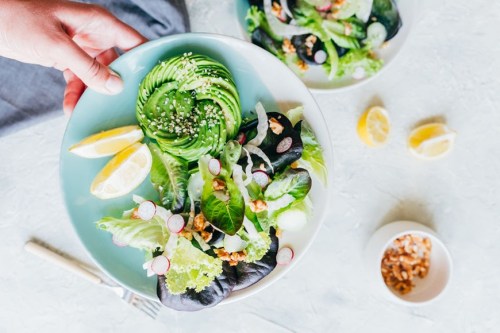Our editors independently select these products. Making a purchase through our links may earn Well+Good a commission
Can you go vegan without burning out your brain?
There are a lot of mixed messages out there about how a vegan diet can impact your brain health. Here's what experts have to say on the subject.

Okay, I get it: being vegan is pretty damn good for you. The eating plan is consistently ranked as one of the best diets for weight loss and diabetes management, and is associated with lower cancer rates and better gut health. Plus, shunning animal products in favor of fruits, veggies, nuts, seeds, and grains is widely considered to be better for the environment. And as someone who was recently told to avoid dairy because of an autoimmune condition, I’ve definitely considered going fully vegan after years of experimenting with vegetarian and flexitarian eating.
However, while most downsides about veganism have been largely debunked (yes, you can get enough protein!), there’s one concern I still have: Will such a restrictive diet mess with my brain health? Rather than going down an Internet rabbit hole, I decided to throw this question to experts to unpack.
Do you lose any brain-boosting nutrients by going vegan?
Possibly. Research shows it can be a lot harder to get all the vitamins, minerals, and nutrients essential for proper health with such a limited diet. That’s particularly true when it comes to brain health—in nixing all animal products, you’re eliminating key sources of omega-3 fatty acids and vitamin B12. Omega-3s, particularly a variety called DHAs, have been shown in studies to be “associated with better non-verbal reasoning, mental flexibility, working memory, and vocabulary,” says Lisa Mosconi, PhD, author of Brain Food: The Surprising Science of Eating for Cognitive Power. And a vitamin B12 deficiency, she says, has been shown to trigger “cognitive deficits” similar to what happens to people with dementia. (A B12 deficiency can also manifest as depression and fatigue, and has been linked to neurological disease.)
And that’s where veganism can make things tricky. DHA omega-3s are generally only found in seafood, says Dr. Mosconi. Plant-based foods do contain omega-3s, she adds, but it’s a different type known as ALA. “The brain is able to convert ALA to DHA, but the conversion is not very efficient,” she says—so relying on just foods with ALAs for your DHA needs is not going to cut it. There is one vegan-friendly exception to this rule: Supplements made from algae, Dr. Mosconi says, have DHA but are okay for vegans to eat.
As for vitamin B12, Dr. Mosconi says, “the good bacteria in our gut make some vitamin B12, but the rest needs to be obtained from the diet, which means animal food and fish since plant-based foods contain no B12.” This would be bad news for vegans except that supplements are available in vegan-friendly form. You can also look for fortified foods like nutritional yeast, which contains tons of vitamin B12.
One thing you’re not missing out on as a vegan: cholesterol. Yes, it’s the boogeyman of heart health, but some amount of cholesterol is actually essential—it protects your brain’s neurons and ensures quick communication between the cells that control thought and movement. But eating foods like animal protein and fat don’t affect your brain’s cholesterol levels at all, says Dr. Mosconi (it makes its own supply), so as a vegan, missing out on dietary cholesterol won’t directly mess with your brain.
However, your bod does need some cholesterol to make hormones (like estrogen), and those hormones have a strong energizing effect on the brain. “If your cholesterol levels are too low, that can be a problem leading to amenorrhea (lack of menstrual cycle), which can also impact the brain,” she says. This doesn’t happen to everyone who goes vegan (phew!) so Dr. Mosconi suggests monitoring your cholesterol levels with your doctor to ensure healthy hormone production.

Are there any specific brain-related perks to going vegan?
All of that in mind, there are some advantages to a fruits-and-veggies-based diet with respect to brain health: all the vitamins. “Recent research has shown that high vitamin E levels in the blood are related to less memory loss,” says vegan nutritionist and Well+Good council member Kimberly Snyder. “Less memory loss is also associated with higher levels of vitamin C and selenium, both of which reduce free radical activity.” Both Vitamins E and C are antioxidants found almost exclusively in plant foods, she tells me, while selenium is found in both animal- and plant-based foods.
And while I’ve heard that meatless diets are linked to degenerative brain diseases like Alzheimer’s, Dr. Mosconi tells me I am misinformed. “To the best of my knowledge, there is no evidence for a link between veganism and risk of Alzheimer’s,” she says. “There is instead plenty of evidence that a plant-based diet rich in veggies, fruit, grains and legumes, with moderate amounts of fish and smaller amounts of meat and dairy—like the Mediterranean diet—is protective against dementia.”
Neal Barnard, MD, president of the Physicians Committee for Responsible Medicine and a long-time proponent of plant-based diets, agrees—though he’d skip the meat entirely. “First of all, the Chicago Health and Aging Project found that those generally avoiding saturated fat—found mainly in dairy and meat—were less than half as likely to get Alzheimer’s, compared with those eating abundant amounts of saturated fat,” he says. “Researchers at Loma Linda University found that individuals who skipped meat were only one-third as likely to develop Alzheimer’s disease, compared with those who routinely ate meat.” With that said, Barnard re-emphasizes the importance of taking vitamin B12 and vegan Omega-3 supplements for maintaining brain health long-term.
And again, since vegans generally eat more fruits and vegetables than animal eaters do, Snyder tells me they may be doing a better job of protecting their brains long-term. “Free radical damage is so important to the process of cognitive dysfunction and dementia, and researchers believe that consuming dietary antioxidants can shield our brains from this damage,” she says. “Animal-based foods lack antioxidant shields and tend to activate free radical production and cell damage, while plant-based foods, with their abundant antioxidants, tend to prevent such damage.”
The bottom line? Talk to your doctor before taking on any extreme diet change—and if you do try going vegan, be extra-vigilant about including hard-to-get nutrients like omega-3s and vitamin B12. Your brain (and bod) will thank you.
Expecting to expect soon? Here’s the data on whether or not you can safely shun animal products with a baby on board. Plus, learn how to get enough protein on a vegan diet (spoiler alert: it’s easy!).
Sign Up for Our Daily Newsletter
Get all the latest in wellness, trends, food, fitness, beauty, and more delivered right to your inbox.
Got it, you've been added to our email list.










